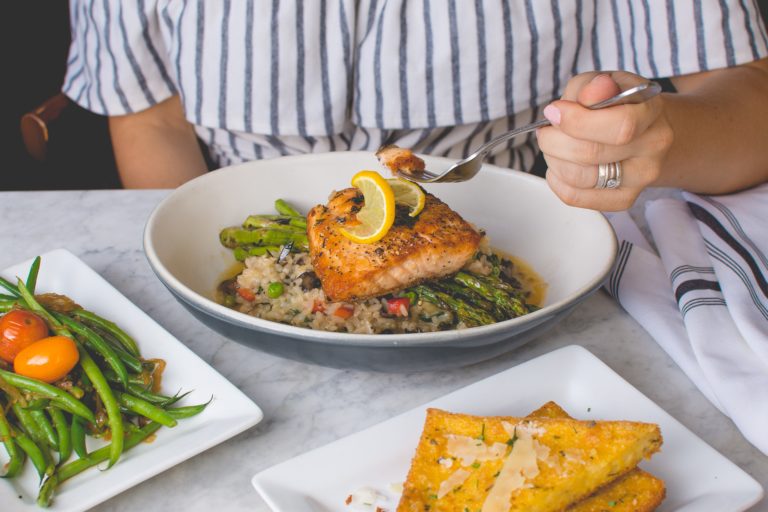Excerpt from Enlightened Weight Loss
Balance Your Meals
Unfortunately, you won’t get ideal results from only eating pizza and ice cream every day. It’s not that you must eat perfectly all the time. You could lose weight regardless of what you eat, as long as you’re hitting your calorie target. However, eating junk every day will wreak havoc on your health, gut, and mood. For the most part, you should eat nutritious meals that have protein, non-starchy vegetables, and slow-digesting carbs. Below are examples and benefits of those food groups; you can get specific recipes and meal plans from my website .
Protein
You need protein in your diet to maintain muscle. Proteins are also typically slow to digest, so they will keep you full. You can get protein from animal sources like eggs, meat, fish, or poultry, or from plant sources like quinoa, grains, beans, lentils, nuts, or seeds. You can use soy products, but they’re usually processed and genetically modified. Go for organic tofu, tempeh, or edamame. For animal products, it’s best to choose organic because they’re free from antibiotics, growth hormones, and appetite stimulants. For beef and milk, the best quality is from grass-fed cows.
Slow Carbs
You can eat carbs and still lose weight. It isn’t necessary that you completely omit them from your diet. One of the problems that can occur if you rely on carbohydrate restriction for weight loss is deprivation. Completely eliminating foods usually leads to an intense desire for them. That can cause you to binge on them or at least feel deprived which will not create a lasting diet.
If you decide that eliminating carbs will not create deprivation then it can speed up your weight loss. Just be conscious of the other means of weight loss that we discuss, because people often regain weight following a low carb diet because it was their only means of weight loss. Once they inevitably revert back to consuming carbs, they have no other way of maintaining their weight.
When following a low carbohydrate diet, aim for about 50 grams or less of carbs per day. There are many recipes for low carbohydrate meals and deserts if you search for ketogenic recipes.
However, it is not necessary that you reduce carbohydrate intake. That being said, not all carbs have the same effect on your body. You want most of the carbs you eat to be slow-digesting, like quinoa, beans, legumes, teff, bulgur, buckwheat, brown rice, millet, kamut, oats, squash, fruit, or plantains. Sweet potato and white potato are fine too, in moderation. Carbs that dissolve slowly will keep you full longer. They’ll distribute sugar into your blood more slowly. Meaning your cells have time to use the sugar for energy. As opposed to foods like pasta, bread, white rice, sugar, and soda, which digest quickly and distribute sugar into your blood all at once. Your cells can’t use all of that energy at one time, so the excess sugar is stored as fat.
It’s not that you can never have pasta or bread again, but it’s something to work on limiting.
Look back to the section on Healthy Alternatives for products that mimic your favorite carbs without a high sugar load. If you’re a vegetarian, you can double up on beans, lentils, and quinoa because they’ll count as your carbohydrate and protein.
Fat
The fat in your diet should be coming from lean meat, fish, avocado, and a little bit of extra virgin olive oil. Other oils are usually processed with chemicals, even if they aren’t listed in the ingredients. Keep in mind that fatty foods like avocado, nuts, seeds, and nut butters are high in calories, without doing much to fill your stomach. They’re healthy, but if you’re a smaller person that doesn’t have many calories to work with, then they’re not your best option.
Non-Starchy Vegetables
A third to a half of your meal should be non-starchy vegetables. They’ll fill you up with almost no calories. They tend to be anti-inflammatory and packed with antioxidants, so they’ll improve your health and mood and regulate your appetite.
Non-starchy vegetables are green leafy vegetables, asparagus, eggplant, artichokes, beets, Brussel sprouts, carrots, celery, cucumber, cabbage, cauliflower, mushrooms, onions, turnips, peppers, radishes, string beans, tomato, and zucchini.
Starchy vegetables like corn, peas, potatoes, and yams don’t count towards the vegetable part of your meal. They have a lot more calories and would count as the carb part of your meal.



